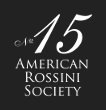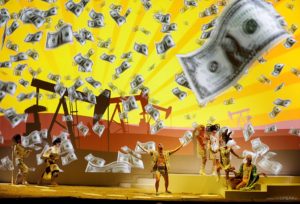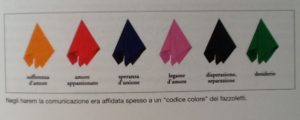What color handkerchief will you be waving? Click on picture to learn more!
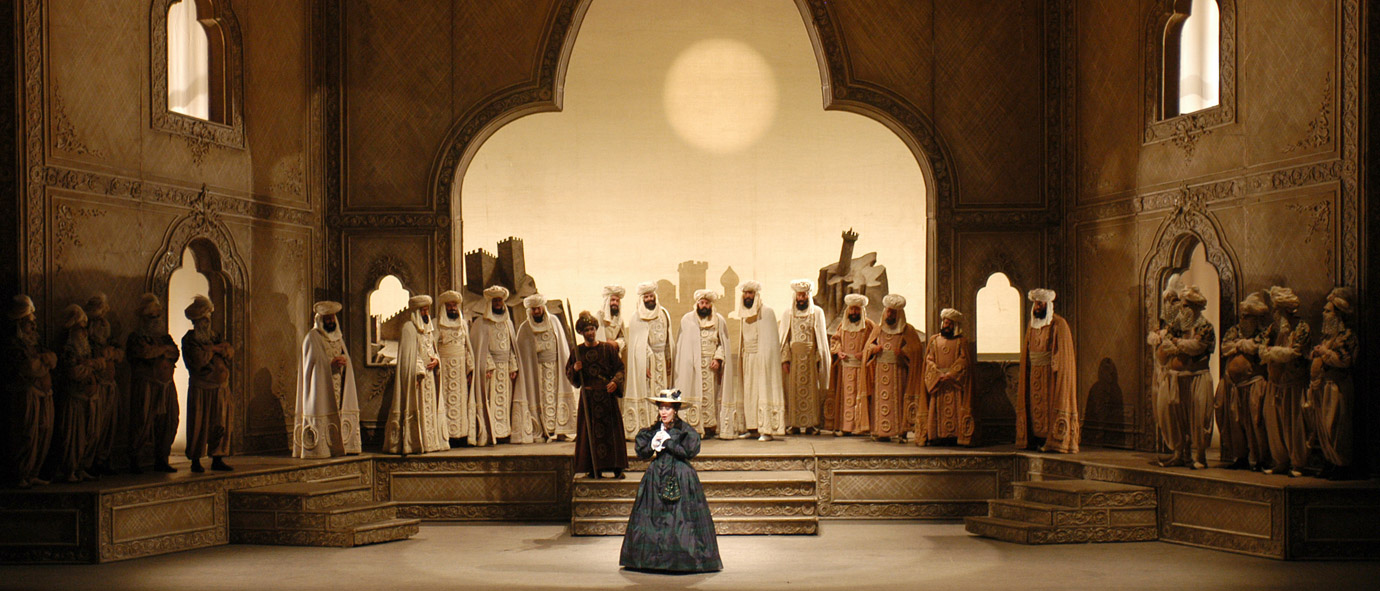
L’Italiana in Algeri will be starting its Met on October 4th,with an all-star cast conducted by the beloved James Levine, and an absolutely exquisite production by Jean-Pierre Ponnelle which the Met has had the wisdom to retain.
The cast includes Marianna Pizzolato *#,Ying Fang,Rihab Chaieb, Rene Barbera #,Nicola Alaimo *#, Dwayne Croft, and Ildar Abdrazakov.
* graduates of Accademia Rossiniana
# Performed at Rossini Opera Festival
This is an opera to be simply enjoyed! The story is clear and uncomplicated; the music is Rossini at his best; and there are no really “bad guys” just a character who needs a little “attitude adjustment” which is provided by L’Italiana and her co-conspirators.
This does not mean, of course, that this opera is without complication when you dig a bit into its history and what was going on in the world at the time of its composition
We are fortunate that Philip Gossett, one of the world’s foremost Rossini scholars has written at some length about L’Italiana in his book “Divas and Scholars.” We will get to some of his points later.
First it might be good to address the matter of how audiences viewed that part of the world at the time the opera was composed, and how it is viewed today.
Today, nothing says it better than this picture from a recent, award-winning performance at the Rossini Opera Festival in Pesaro. The production is by Davide Livermore, who really went over the top in his irreverent and spot-on take on the story.
Then there is a more sober account of how audiences viewed that part of the world in the past, found in an interesting new book by Larry Wolf, “The Singing Turk” ( learn more at www.singingturk.com)
Actually it is likely that Rossini and his audiences were more pre-occupied by what was happening among European countries at the time of the premier, than any external threats. The censors certainly weighed in on some of the text ( although Rossini cleverly included a musical reference that most audience members would have picked up on). The example is from Gossett’s book.
Gossett points out that ” “L’Italiana in Algeri was more problematic to the censors than many other Rossini operas, and he cites the changes to just one aria, the famous “Pensa alla patria” ( Think of your country). Certainly when sung by someone like Marilyn Horne one could easily understand that this might have been a call to “rally the troops”, and in the case of Horne, Americans might have been forgiven for thinking that she was singing to them!
In Rome the censors changed the line to “Pensa allo scampo ” ( think of escape ). Yet another substitution was “Pensa alls sposa” ( Think of your wife). It may be hard to understand that in those days words actually meant so much that the censors felt it necessary to make such changes. Modern audiences have become quite used to the fact that often a libretto’s words have no connection to what is seen on stage.
Gossett also addresses orchestral changes and these are quite interesting because Rossini’s operas are often ill-served in large houses with large orchestras. The changes that piled up over the years affects, as Gossett says, “the very texture of the score”. Just one example serves to illustrate this point. Rossini did NOT use trombones in his operas ( with rare exceptions) but over the years three trombones turned up in the score!
The history of misguided alterations was finally stopped when the Fondazione Rossini “restored the opera to its correct orchestral format” as Gossett says, continuing “The delicacy, lightness,and precision of Rossini’s orchestration was scarified to a late nineteenth-twentieth-century vision of orchestral sonority and was then sanctified by ignorant twentieth-century musicians as belonging to the “tradition,” a “tradition” invented by musicians with no sense of Rossini’s orchestration and totally extraneous to the opera that delighted all Europe during Rossini’s lifetime.”
In spite of all these attacks on Rossini’s score, L’Italiana has managed to survive and in the right hands delights audiences today as it did back when it was first performed.
Oh, the handkerchief! Opera houses in Italy often provide the program books that are real treasures. The Teatro Comunale of Bologna is no different. We have included a picture featured in one of their recent books with a guide to the colors of the harem. When you attend the Met, be sure to look around for signals!!
Tancredi, coast to coast!

Rossini fans on the East Coast have a unique opportunity to hear Tancredi in Baltimore, September 30 and October 2nd.
Follow the link for details!
http://www.baltimoreconcertopera.com/tancredi-1/
After the performances in Baltimore, the artists relocate to Albuquerque for performances at Opera Southwest.Oct 23,26,28,30, this time in a “full” production.
http://www.operasouthwest.org/operas/tancredi
This arrangement is possible through the partnership of Baltimore Concert Opera with Opera Southwest and the commitment to Rossini by the conductor Anthony Barrese.
While you are visiting Baltimore Concert Opera’s website, be sure to download the Tancredi “study sheet”. It is not only informative and entertaining, but also a model for what opera companies interested in “growing” audiences might consider doing. Bravo to them!
October 16th deadline for Rossini Competition!
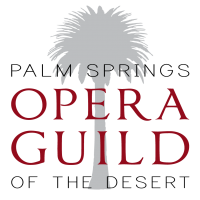
After a successful debut, the Palm Springs Opera Guild will again be hosting the competition for the Rossini Award! Among the distinguished jury is Rockwell Blake, who we are proud to have on our honorary board. This is an excellent opportunity for young singers to display their Rossini talent, and we urge everyone to visit the Guild’s website palmspringsoperaguild.org for more details.
Accademia Rossiniana “reunion” at Lincoln Center!
The Metropolitan Opera is featuring two Rossini Operas this fall, and no less than three Accademia Rossiniana alumni will be gracing the stage! Nicola Alaimo ( class of 2000) will be starring as Taddeo in “L’Italiaa in Algeri”, while Marianna Pizzolato (class of 2003) will be our Isabella ( a last minute substitution, aren’t we lucky she was able to do it!) . Marina Rebeka ( class of 2007) will take on the role of Mathilde in “Guillaume Tell” which she sang to much acclaim in Pesaro.
But wait, there’s more!
It’s not Rossini,but … At David Geffin Hall, The London Symphony Orchestra will be performing the Verdi Requiem under the baton of Gianandrea Noseda with our honorary board member Daniela Barcella ( class of 1995) as part of the stellar cast! Looks like Pesaro has come to NYC for awhile!
Interview with Alessandro Marangoni
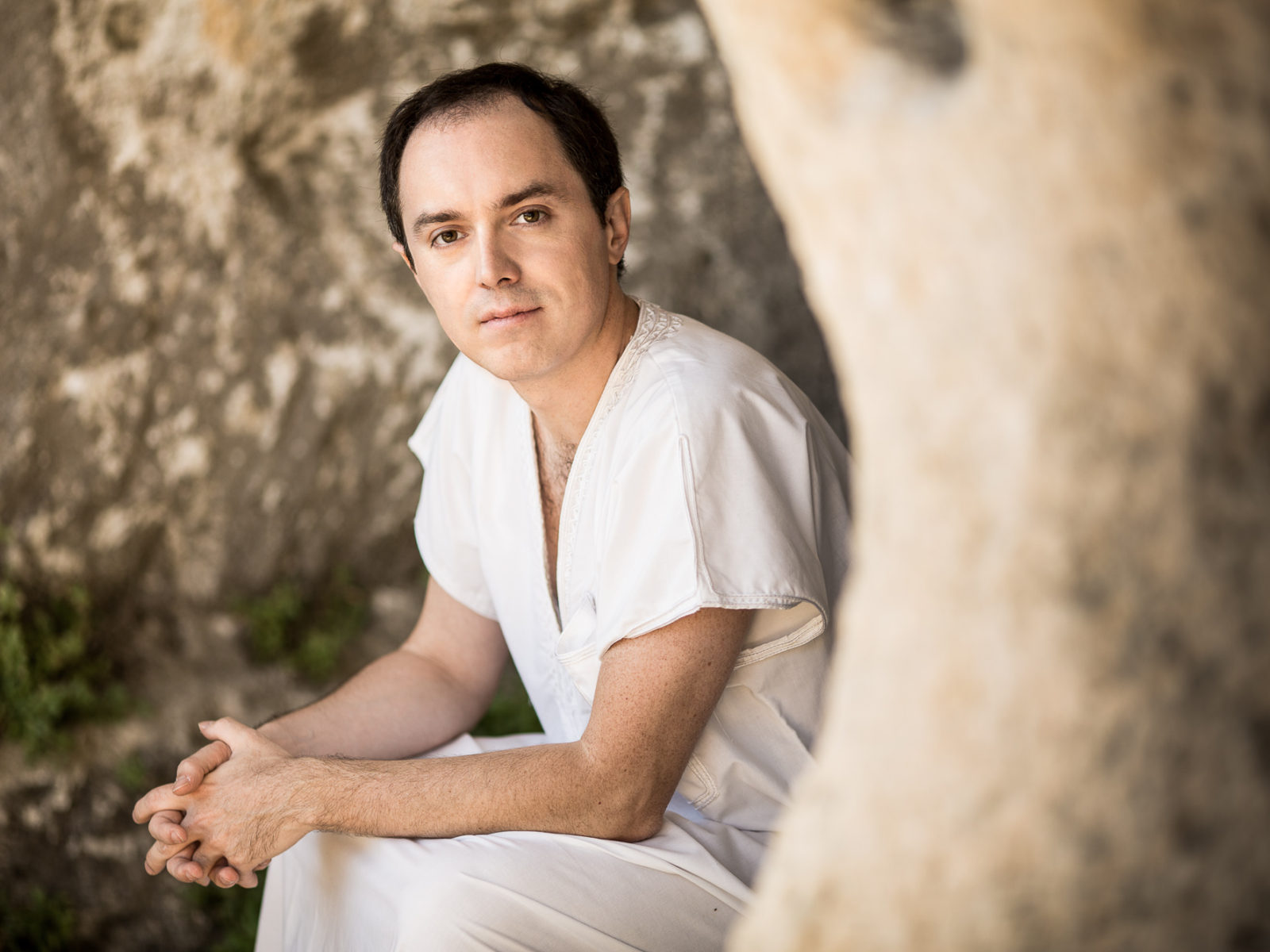
Rossini continued to compose after William Tell which was his final work for the stage. Although his piano pieces are smaller in scope, they show his wit and wisdom in a way that no opera perhaps could. They are not easy to play, and not performed as frequently as they deserve to be.
Italian pianist,Alessandro Marangoni, who is giving a concert in Chicago on September 2nd appeared at the Rossini Opera Festival in 2015.In addition to performing he participated in the presentation of a recent book about these pieces of Rossini. At that time we asked him if he would be willing to be interviewed for RossiniAmerica.org, and he graciously agreed.
Below are his answers to our questions which we posed in December of last year. Some of the information is therefore not up-to-date. Our apologies!
Q.Please tell a us little bit about yourself and how you came to play Rossini.
A. When I was 4 years old I went to listen to a concert in a church with my parents and a choir was singing some pieces from Rossini’s Mosé. I was astonished and I immediately asked to buy a piano to start playing Mosé: an unusual repertoire choice for a young pianist… After years of studies of the “normal” literature for piano with my teacher Maria Tipo (the great neapolitan pianist) I discovered some pieces by Rossini, “Péchés de vieillesse”, and I started to explore a new world, beside my usual concert repertoire like Bach, Beethoven, Clementi, Mozart, Chopin, Scarlatti, Busoni…: suddenly it came the great challenge to play and record for Naxos not only the complete works for piano but the entire opus in 14 Volumes by Rossini! So, since I was very young I feel Rossini very close to me, like a friend or an uncle…
Q. What are the challenges of playing this music as compared to that of other composers?
A. Rossini dedicated his piano pieces to the “4th class pianists” and he thought to be a “4th class pianist” but of course it’s a ironic way to exorcize the difficulty of these pieces: we can find every technical difficulties (sometimes it seems to play some Liszt) but also the necessity for the pianist to go deeper and analyze the non-common harmonic modulations of this music. Rossini is never predictable and always ready to stupefying both the listeners and performers. His style is romantic yet and projected to the future (he anticipated Satie, for example) and he uses the complete dynamic and extension of the keyboard.
Q. In the case of ” I Péchés de Vieillesse” can you describe a little of what you love about them?
A.I just love it that I can be a servant of the great composers throughout the centuries, to be constantly in touch with some of the greatest minds and spirits of all mankind, and always to be learning from them…With such a fantastic instrument as the piano, and the company of the great composers, I feel as though I’m on a perpetual and extraordinary voyage. In the case of “Péchés de vieillesse” I feel something familiar and a special sympathy for Rossini, perhaps because I love him since I was a little child.
Every piece is “a world”, described with great musical science but also with an ironical way and there are full of amazing surprises!
Q. Could you give some examples of which specific ones you like and why. It would be really nice if you could emphasize the diversity of this collection.
A.Rossini wrote more than 120 pieces in 14 volumes that his second wife, Olympe Pellisier, collected after composer’s death. Each Album has a title given by him and it funny to read the complete list of the titles: for example, “Mon prelude hygienic du matin”, “Prelude l’huile de recin”, “Gymnastique d’ecartement”, “Petit Polka Chinoise” (I wonder how is possible a Chinoise polka…but of course for Rossini’s ironic way of life all is possible!); or other nice titles like “Barcarole”, “Un pensee á Florence” etc. Of course there are some pieces I like more to play like “Une caresse á ma femme”, a wonderful and romantic piece I often play in my recitals, “Un petit train du plaisir”, a very funny story – quite famous – about a train (Rossini hated trains), in a very modern conception that anticipate the XX century musical forms, and of course “Petit caprice style Offenbach”, in which Rossini ask the pianist to use a very uncomfortable and uncommon fingering 2-5-2-5-2-5…Here you can watch the video in which I was playing this piece with original fingering:
I also did some experiments with the colors in a project called Chromoconcerto: Rossini’s piano music is full of colors and I think he was very interested in the sound-color of the instruments he played (Erand and Pleyel). In this video I play Barcarole from “Album pour les enfants degourdis”:
Q. What are some of your future plans? ( ed note, as of December 2015)
A.I have a lot of work to think about for 2016 and 2017: of course the first important thing is to complete my recordings dedicated to “Péchés de vieillesse” with some manuscripts for piano solo that I recently discovered and the last Albums with the singers. Then concerts with orchestra and special projects like Evangélion by Castelnuvo-Tedesco and the Chromoconcerto. I’m scheduling a Rossini USA tour for the fall 2016 to bring Rossini’s piano repertoire to America: I think the American public could appreciate a lot this sparkling music!
6. Website, discography, etc.
www.alessandromarangoni.com
www.alessandromarangoni.com/discography
Link to Rossini’s book (italian): http://www.amazon.it/P%C3%A9ch%C3%A9s-Vieillesse-Gioachino-Rossini/dp/886866108X/ref=sr_1_1?ie=UTF8&qid=1451392977&sr=8-1&keywords=peches+de+vieillesse+rossini+fargnoli
Don’t miss this concert in Chicago!
ALESSANDRO MARANGONI PRESENTS: ROSSINI & CHOPIN
Friday, 02 Sep 2016 – 7:30 PM
Venue: PianoForte Studios, 1335 S. Michigan Ave.
FREE
https://www.pianofortefoundation.org/concert/alessandro-marangoni1
Hear the Rossini stars of the Future, direct from ROF!
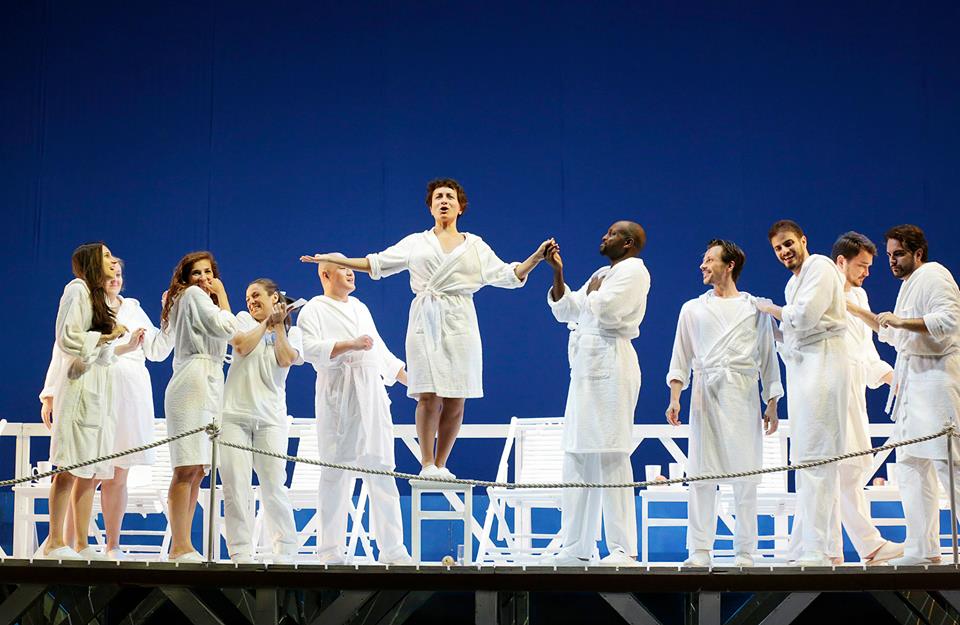
The Rossini Opera Festival will broadcast this year’s “Il Viaggio a Reims” from their website, RossiniOperaFestival.it, on Friday, August 12th. To our friends in the US, you don’t have to take a day off from work, but you either have to get up very early, or stay up late, depending on your time zone!
The performances will be broadcast at 11 AM, Italian time. In addition, the broadcast will be available on the Festival’s youtube channel.
Here’s your chance to hear the Rossinians of the future!
Would you have liked to hear Daniela Barcellona, Paolo Bordogna, Nicola Alaimo,or Luca Salsi before they “became famous”? How about Vittorio Prato, Maxim Mironov, Olga Peretyatko, or Marina Rebeka? They were all participants in Accademia Rossiniana whose graduates have been appearing ( since 2001) in the annual performances of Viaggo a Reims.! So, you never know who will make a breakthrough.
This year’s star of “La Donna del Lago”, Salome Jicia, is seen in this picture ( center) in a performance of Viaggo at last year’s Festival.
Not to be missed!
If you can’t make it to Pesaro, you can listen here!

Again this year, RAI will be broadcasting the opening nights of the 3 featured operas of the Rossini Opera Festival. On August 8,9, and 10th you can listen to the webcast of “La Donna Del Lago”, “Il Turco in Italia”, and “Ciro in Babylonia”. Curtain is at 8 pm Italian time, so that’s 2 pm, Eastern, etc.
Follow the link and on the Rai Radio 3 website click on “Ascolta in Diretta”
http://www.radio3.rai.it/dl/portaleRadio/concerti/ContentItem-5fcd9d5c-9bc6-4f51-8715-4eaf4e0f3ece.html
Turkish Delight

Il Turco in Italia is NOT a “lesser” L’Italiana in Algeri!
As some who don’t know Rossini might think: “Well, first he sent an Italian girl to Algeria, and that worked so well, so now he’ll try doing it the other way!” NOT SO!
Although “Turco” is less well known, it is on the same artistic level as “L’Italiana” and we wanted to share some thoughts about this opera in anticipation of its appearance at ROF 2016.
As it turns out, we have an excellent guide in the program notes by the legendary Rossini scholar,Phillip Gossett, written for a CD recording of this opera on Phillips. By the way, the Alaimo in this recording is related to the Alaimo who will be singing in Pesaro. Rossini must run in the family.
Gossett starts by debunking the myth that Turco is filled with self-borrowing. “ Corriere delle dame “( Aug 20, 1814) seems to have been the origin of this story.
Then, Gossett declares that Turco is not a poor relative of L’Italiana.
Some of Gossetts points are:
1. L’Italiana is a zany farce with a serious side. Turco, on the other hand is a “comedy of manners” whose themes seem peculiarly modern.
2. If one wants to link “Turco” to another opera, one should look to Mozart’s “Cosi fan tutte” !
There are so many between the two operas, according to Gossett, including the librettist, some of the singers who created the roles, and so forth.
So, those of you who are joining us in Pesaro, think “Mozart” when you hear this opera. Our conductor, Speranza Scappucci, brings her Mozart sensibilities with her, and it is bound to be a memorable experience.
For those who cannot make it, we will post information about the RAI broadcast, both here, on FB and twitter.
